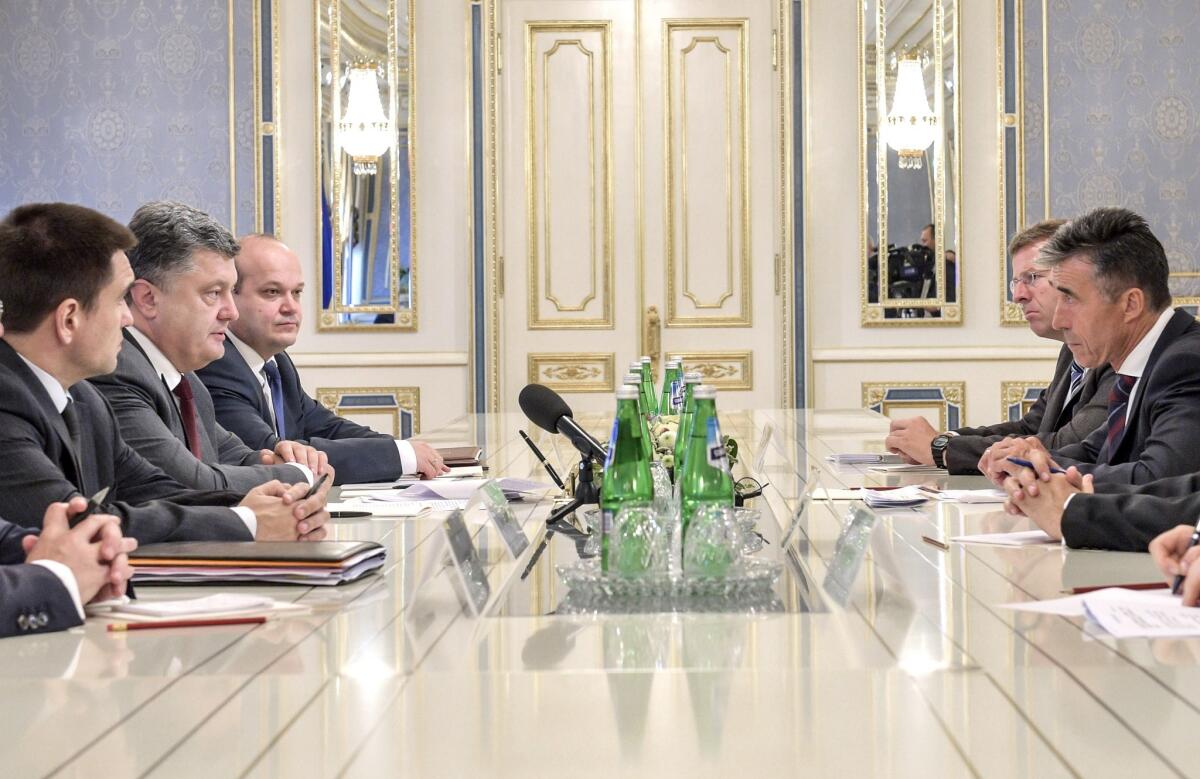NATO aid to Ukraine likely to sharpen conflict with Russia

- Share via
NATO Secretary General Anders Fogh Rasmussen visited Kiev on Thursday to offer help from the Western alliance to shore up Ukraine’s defenses as government forces close in on pro-Russia separatists in the embattled east of the country.
The NATO chief’s proposal for the alliance to provide modern communications, cyber defense equipment and command-and-control guidance were likely to inflame hostilities between the Kiev government and Russian President Vladimir Putin. The Kremlin leader has defended his aggressive actions against Ukraine in recent months as a necessary response to the threat of losing its neighbor and fellow former Soviet republic to Western adversaries.
Much of Russia’s production of military equipment and armaments depends on the acquisition of Ukrainian-made components, and the rebellion by pro-Russia militants in eastern Ukraine has been at least partly inspired by the Kremlin’s demand that the heavily industrialized regions remain economically and strategically intertwined with Russia.
NATO leaders have been among the most vocal in recent days to warn of signs that Putin has amassed 20,000 Russian troops and more than 1,300 tanks on Ukraine’s eastern border in what they fear could be preparation for invasion.
Pro-Russia separatists seized the two main cities in the eastern industrial heartland, Donetsk and Luhansk, in March and April, but in the last month have lost half the territory they once controlled to a resurgent government counteroffensive.
Rasmussen met with Ukrainian President Petro Poroshenko, Prime Minister Arseny Yatsenyuk and parliamentary speaker Oleksandr Turchynov for talks on enhancing cooperation between the alliance and Ukraine, including NATO assistance with logistics and strategy, Ukrinform and the presidential website reported. There was no discussion of “lethal aid,” although Rasmussen warned of further Western sanctions and other unspecified responses should Russia continue interfering in eastern Ukraine.
“I call on Russia to step back from the brink. Step back from the border. Do not use peacekeeping as an excuse for war-making,” Rasmussen said after his meeting with Turchynov at the Supreme Rada.
The NATO chief also announced that the alliance was suspending all cooperation with Russia and condemned Moscow’s seizure and annexation of Ukraine’s Crimean peninsula earlier this year.
There was no formal response by the Kremlin to Rasmussen’s visit or announcements. But the official Itar-Tass news agency quoted a parliamentary leader as dismissing previous joint programs between the alliance and Moscow as superficial and insignificant.
Viktor Ozerov, Federation Council security committee leader, compared the short-lived NATO-Russia Council to a bad marriage whose dissolution left “no property to divide.”
Rasmussen’s visit to Kiev, though, was likely to heighten concerns in the Kremlin that Ukraine is realigning its economy and security with the European Union and NATO, to the detriment of Russia.
Putin last year pressured then-President Viktor Yanukovich to abandon an EU association agreement that would have opened European markets to Ukrainian goods and potentially led to membership in the 28-nation joint economic space. When Yanukovich capitulated, supporters of closer ties with the West rose up in protest, sparking a three-month rebellion that toppled Yanukovich in February.
It was the loss of Putin’s pliable ally in the Kiev presidency that spurred the seizure of Crimea and the uprising by pro-Russia gunmen in eastern Ukraine, which Kiev and the West say was instigated by Putin.
Follow @cjwilliamslat for the latest international news 24/7
More to Read
Sign up for Essential California
The most important California stories and recommendations in your inbox every morning.
You may occasionally receive promotional content from the Los Angeles Times.











